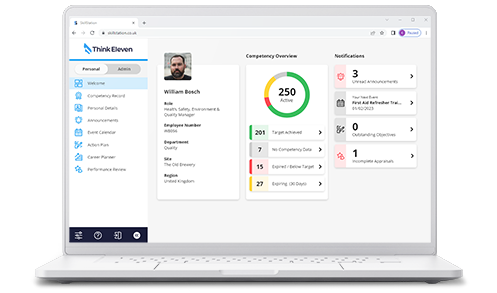Todays post critiques the dominance of digital training and AI hype surrounding Learning and Development (L&D). We highlight the need for a more well-rounded approach that includes offline training, skill assessment, and meaningful AI applications and emphasise the importance of competency management and a holistic strategy for fostering a competent workforce.
In a world that's becoming increasingly digital, it's no surprise that the focus of Learning and Development (L&D) often centres around the delivery of digital training. After recently attending a Learning and Development Exhibition this was further validated. The leading narrative in the room was delivering digital training with AI being the silver bullet for quickly building engaging content.
Digital training is undoubtedly valuable, however:
A narrow focus on training overlooks the multifaceted nature of employee development, often leaving gaps in skill acquisition, ongoing assessment and a disconnect between learning and job performance.
In this article we want to shed light on our observations and key takeaways from the event and how the narrative of L&D needs to change.
Digital Training Dominance
One prominent observation from the expo was the overemphasis on digital training. In recent years, there has been a rush to digitise every aspect of learning, with Learning Management Systems (LMS) and eLearning platforms at the forefront. While these tools have their merits, the danger lies in losing sight of the bigger picture.
Whilst delivering all training through eLearning might be convenient, the reality is that L&D should not be restricted to what can be delivered digitally. Practical skill development, especially for complex or soft skills often demands hands-on experiences, interactive learning, and real-time feedback. Personalisation, job relevance, teamwork and communication skills, complex problem solving, and adaptability are better fostered through offline methods that a Learning Management System (LMS) simply cannot record nor measure.
The Full Spectrum of L&D
It became evident that many L&D professionals are fixated on improving engagement with eLearning and enhancing LMS functionality. However, L&D extends beyond this narrow scope. Offline training, hands-on experiences, and the robust assessment of skills are vital components of a comprehensive L&D strategy.
Rather than focusing solely on what can be easily digitised, organisations should focus on fostering a competent and adaptable workforce. This means embracing a holistic approach to L&D, incorporating competency management and diverse learning development methods as part of a comprehensive strategy. This approach ensures that employees are not only knowledgeable but also capable of applying their skills effectively in the real world, ultimately benefiting both individuals and the organisation.
Language and Competency Management
Competency management is a term that is sometimes misunderstood or underutilised. People are more accustomed to the language of Learning Management Systems, and this familiarity can be a barrier to embracing the broader concept of competency management. Competency management focuses on evaluating and measuring the skills, knowledge, and abilities of employees. It's not just about learning; it's about demonstrating competence in practice.
AI Hype vs. Real Utility
Artificial Intelligence (AI) was a hot topic at the expo, and seems to be the buzzword in the L&D industry with vendors rushing to add some form of AI to their systems to give the perception of being at the cutting edge of tech.
While AI holds significant promise, there's a risk of it being perceived as a trendy add-on rather than a genuinely useful tool. The key is to identify meaningful and practical applications of AI in L&D. For example, using AI to analyse and gain insights from competency data could be incredibly valuable. Predicting future skill gaps, planning training more efficiently, and proactive succession planning are a few examples where AI could deliver real value.
In Conclusion…
The expo served as a reminder that L&D is not just about delivering digital training or improving LMS engagement. To foster an optimised and competent workforce, a broader approach is needed. This includes recognising the importance of competency management, embracing offline training and skill assessment, and understanding the value of real and practical applications of AI. By doing so, organisations can truly unlock the full potential of an engaged, productive, optimised and future-ready workforce.


